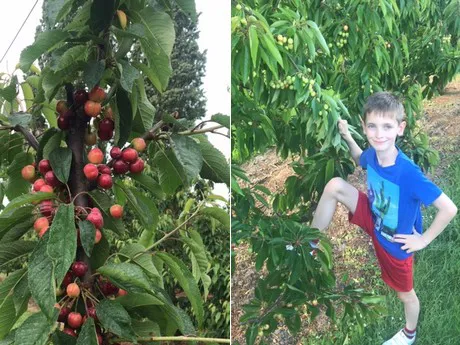In about two weeks, the cherry season will start again. “The early season is looking good. We had quite a lot of a thunder storms this week, but fortunately there were no damages. The season starts about two weeks later than last year. This year, the weather is much more changeable,” says Bert Vanweddingen of Cherryfarm. “The mid-season is a bit less in places that experienced frost, but plenty of cherries will be available in this peak period.”

The Folfer variety, left; Bert’s son with the Samba cherries, right.
“Last year, we had a good cherry season, but the extreme heat did affect the slightly softer cherries. That’s why our company was dedicated to the firmer cherries this year. We do have some softer varieties to get the season started, but when buyers prefer the firmer cherries, we have to respond to that,” Bert says.
Kordia
Although investments are still being made into the development of new varieties, Kordia is still number one this season. “We start with Folfer, Samba, Summit, then Kordia, and we finish with Regina,” Bert continues. “In recent years we noticed that the apple production has to give way to the cherry production more and more. Growers are now only planting club varieties in apples, or they’re switching to the production of cherries or pears.”
Challenge
“One of the biggest challenges for the future is the Suzuki fruit fly. Last year, we weren’t too bothered by it, fortunately, because the fly couldn’t multiply due to the warm weather, yet this little animal is still a major problem in the production. Besides, the shortage of workers will also cause problems. We’re currently working with Romanians, but some growers are already working with Ukrainians. We have to look for workers further and further away, and it’s becoming more difficult to find good workers as well,” Bert concludes.
For more information:
Bert Vanweddingen
Cherryfarm
Sint-Kristinastraat 12
3800 Brustem – Belgium
+32 11 68 39 46
info@cherryfarm.be
www.cherryfarm.be
